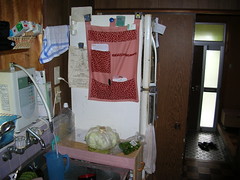Tuesday, January 30, 2007
Car inspection
We have to have our other car inspected later next month, which will cost even more, because it is a larger car, and I want them to more careful with it, because it is the family car. My car, if it runs safely, that's enough. But for the whole family, I don't want breakdowns or irregularities.
Cars are expensive, as they should be. They are an luxury, I don't care where you live. Also due next month is our insurance, which will cost us $500. I struggle constantly with the issue of keeping or getting rid of one of the cars. It does encourage good treatment of the car, and frugal driving habits.
Thursday, January 18, 2007
The big question you asked is why am I in Japan. What are the good points? Originally I came for language, and stayed on as my life changed. Now I stay because I have a family, I have a job in a profession that I like, and I have a fulfilling personal life. My wife's family is, so my children have granny and grandpa close by. That is important to me, and it suits their fancy too, it seems. Japan is a great place to raise children up until about the age of high school. The country is safe. There is crime, but nothing on an American scale. Individual crimes are brutal and sensational, but on the whole, children can go anywhere and do anything without a problem.
Education is universally available, cheap, and the teachers are, for the most part, conscientious. They are overworked, underpaid, and treated terribly, but they forge on. I admire them greatly.
Universal health care. Need I say more? From one month before the baby is born, until the time the child is 3, the parent needs to pay not one yen for medical treatment. That is civilized. (One funky glitch is that the delivery of the child costs money. The delivery is not considered to be an illness, and the family pays. Fortunately the $3,000 bill is eventually paid back through another system. The original outlay is substantial, though.) Medical care is universal for everyone covered under the health insurance scheme, as you would be if you were hired by a responsible employer. In fact I went to the doc today for a throat infection, and payed $10 for examination, treatment and medication. I won't launch a tirade against the US right now for their treatment of the young, the poor and elderly, but I am sorely tempted. Like twice the rate of infant mortality, and three fewer years on you life expectancy. And you know who dies more often and earlier, don't you?
Public transportation is a great option, and Japan should be the envy of the world. I can go nearly anywhere in the country by walking out my door, buying a ticket at the train station, and riding. I don't use public transportation to come to work, because there is no economical route to my school, so I drive or bike, but I didn't own a car for the first 10 years of life in Japan. Public transportation is not cheap, but it is half price for children and the elderly. It is also much cheaper if you by a commuter ticket.
My personal life is satisfying. I don't have much time for one these days, but I am now a farmer. I've never written that, but can with confidence, because today I got the paperwork. I decided that there were several things that I could learn about Japan, the language, a martial art, tea, kimono, all of which I have done in the past, but I thought, what makes Japan what it is? The answer is agriculture, and I can't grow anything but a meager garden. Through some contacts, I met a farmer who grows rice organically, so from this year, I am renting some land from him, and learning how to grow my own rice. Hopefully I can use this in my situation as an educator, but even if I can't, my family and I will be ensured of having home grown rice.
Those are but a few of the attractive aspects of life where I am. I and the people of this archipelago are truly blessed.
Osechi Ryori

sechi
Originally uploaded by Yokkaichi 1.
This is a shot of the New Years food that my wife prepared. (I know it's a little late, but with classes starting up again, it has been pretty busy.) Each of the foods has a particular meaning. For example the word for someone who works hard is "mame." So The black beans in the bottom right compartment of the tray on the right will help all who eat them to work hard. All in all, it keeps for a long time, and keeps the wife out from in front of the stove for a few days. Some may call it siege food, but it tastes pretty good. I had to control myself, because my New Year's tradition has been eating too much over the holidays.
Thursday, January 11, 2007
For those interested in the current process of education reform in Japan
Advise on teaching as a profession in Japan
Mr. Kirk, Didn't know how to contact you, so I'm leaving a note on your blog. I thought your views were great, and maybe you could give me some insight. I am researching the possibility of teaching English in Japan. I am a published author, with a background in journalism and commercial writing. I am planning on teaching in Japan and writing another book. I've been researching a lot and thought you might have some insight. If you could spare any advice, re: best companies/schools to work with, I would really appreciate it.My reply:
Thank you for your comment to my blog, EFL in Japan. I enjoy posting there when I have time, which should be more often, but it is mostly about keeping a long-running record of my professional life, one that others like you may me interested in looking at selectively.
As for work in Japan, I came to Kyushu 20 years ago and worked at a "conversation school." You probably know what they are. Conversation schools are all over the place, and it should be easy for a person with your credentials to find a position, but to get a working visa, you may need to look from where you are. Some big conversation schools, like GEOS and NOVA, interview in other countries. Otherwise, I'm not sure how to find a position from abroad.
There are also universities that advertise abroad. You could always apply for a position through one of their offerings. What I could tell you about working here could fill a book, maybe one that I'll write someday, and I have very strong opinions about the treatment of international workers here. I'm not sure what you are interested in, though. Do you think you would like to stay here for a while, like five years or more, or are you here for a year or two of exploration? Do you have a family to support, or are you on your own? If you are single and here for a year or two, anyplace will do. They will pay you a living wage, and you'll have no responsibilities other than to slog out the hours in the classroom. If you plan to be here longer, want to work for one firm for more than a couple of years, and want a better wage, there will be more competition. Japanese schools and companies discriminate against international workers, offering them less favorable employment conditions than may be legally allowable. However, unless you know or care about that, most people never do anything about it.
I strongly suggest that, regardless of what you decide to do, you looked at Arudou Debito's web site, http://www.debito.org/residentspage.html#survivalstrategies . There is a mountain of information there to wade through, but you should get an idea of employment in this country. I personally suggest that after you sign the contract, which is only for foreign workers you understand, that you immediately join the union at the workplace, or you start one yourself. It is easy and the only practical protection you have in this country from immoral and illegal labor practices. Courts of law are generally of no help at all and will cost you endless hours and cash to use.
I would be happy to communicate with you further if you would like to clarify your situation and what options are available to you.
This would go for anyone looking for work here, Japanese or foreign national.
The Korea Times : Early English Education Boosts Scores: Study
Interesting conclusions in this study. Shows that students who started studying English in elementary school are more successful on standardized tests than those who begin in later years. The conclusions are a little dubious though. The study was done with high school students in 2003 and in 2006. The students who took the test in 2003 had not studied English in elementary school. Those who were tested in 2006 had. The scores in 2006 were higher than those in 2003, but there could be other factors. Otherwise, interesting study.
Wednesday, January 10, 2007
Owen believes U.S. can take lessons for education from Asian cultures
He was particularly impressed, he noted, when he discovered that Asian students learn to speak English at a young age.This quote was probably reflects what he was shown, classrooms where young people are studying English. Whether they learn or can speak is a totally different event. I hope he is right.
Arabic, Farsi, Urdu, Mandarin and Russian in particular are being promoted (by the Bush administration), Owen said, because they are of value to the military, Foreign Service and U.S. companies.This is the first time that I have heard of these particular foreign languages being promoted, and for these reasons. The rationale for teaching foreign languages in the past has been so that students can better understand and use English. Now they are being promoted to provide useful personell to Uncle Sam and his loyal corporate sponsors. Sounds like a job for the Defense Language Institute Foreign Language Center in Monterey.
Welcome to the Roxboro Courier = Times
Ode to an old fridge

old fridge
Originally uploaded by Yokkaichi 1.
We recently bought a new fridge, because we need the space, but getting rid of this one felt like throwing out an old friend. It had worked continuously for 18 years, around 157,680 hours, through Japanese summers and four moves. This was a great machine. This was a tribute to human engineering. You can have all the newest whatever, just give me something that works.
Schwarzenegger Wants Universal Health Care for California: Welcome to the 21st Century, America
Japan has socialized health care, and it works. Not terrifically, but it works. People who need help get it. I walked into a dermatological clinic the other day for an infection that I had on finger, and walked out treated and medicated, all to the tune of around $20. There are problems, like the prescription of antibiotics for absolutely everything, but if old people on a fixed income need care, they get it. Unemployed people and their families don't have to walk around uninsured.
Welcome to the 21st century, California.
Tuesday, January 09, 2007
Syllabi for academic year 2007-08
My other other classes will all be English classes, but I have a new one that I'll be doing at the English Support Lounge. This may be highly political, as I will be trying to open it up to the whole university rather than just this department. The politics of trying to do anything inter-departmentally here is ridiculous.